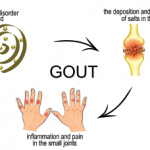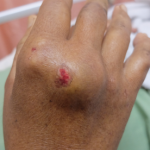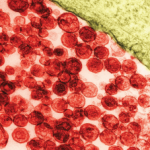ACR Convergence 2025 experts explore gout’s deep ties to MetS, insulin resistance and cardiovascular mortality, weighing new data on colchicine, febuxostat and SGLT2 inhibitors.


ACR Convergence 2025 experts explore gout’s deep ties to MetS, insulin resistance and cardiovascular mortality, weighing new data on colchicine, febuxostat and SGLT2 inhibitors.
In a dose-finding, clinical trial, Terkeltaub et al. examined the safety and efficacy of tigulixostat, a nonpurine xanthine oxidase inhibitor, for lowering the serum urate levels of patients with gout and hyperuricemia.
In this comparative effectiveness clinical trial, Yan et al. set out to compare nontitrated, low-dose benzbromarone (not approved in the U.S.), a renal urate transporter 1 inhibitor, with low-dose febuxostat as the first-line therapy in gout patients with renal uric acid underexcretion.

Elizabeth Hofheinz, MPH, MEd |
Living like a king has its price. And while kings and queens are primarily something of yesteryear, the vast majority of those living in reasonably wealthy nations can now live like kings. Now, back to that price. Gout, once known as the disease of kings, has been around at least since the time of the…

ATLANTA—With more than 3,000 abstracts from 103 countries presented at the 2019 ACR/ARP Annual Meeting in November, it was impossible for attendees to view them all. However, two ACR/ARP veterans—Arthur Kavanaugh, MD, from the University of California, San Diego, and John Cush, MD, from UT Southwestern Medical School, Dallas—chose to tackle the nearly impossible task and…
Using 2007–2016 data from NHANES, a nationally representative survey of American men and women, Chen-Xu et al. set out to estimate the current prevalence rates and decadal trends of gout and hyperuricemia in the U.S.

CHICAGO—The Gout and Hyperuricemia scientific session at the 2018 ACR/ARHP Annual Meeting opened with a talk by Tony R. Merriman, PhD, a research professor at the University of Otago, New Zealand. His talk focused on molecular epidemiology, with an emphasis on the interactions between genes and environmental exposures, and their contributions to gout. Dr. Merriman…

New research raises questions about the cardiovascular safety of febuxostat for gout patients compared with allopurinol. The study found that although febuxostat was noninferior to allopurinol, febuxostat-treated patients had similar overall rates of major adverse cardiovascular events as allopurinol-treated patients, but had higher rates of all-cause mortality and cardiovascular mortality…

Veronika Sharp, MD, Alice Chuang, MD, Lily Kao, MD, RMSK, & Midori Jane Nishio, MD, RhMSUS |
A 57-year-old Ghanaian woman was referred to our rheumatology practice with acute, left elbow swelling and pain. The referring oncologist suspected gout, because the patient had hyperuricemia. Six months before, the patient was diagnosed with stage IV human T-lymphotropic virus type 1 (HTLV-1)-associated adult T cell lymphoma (ATLL). Her initial oncologic manifestations included multiple thoracic,…

Duzallo, a combination of lesinurad and allopurinol, was approved by the FDA in August to treat hyperuricemia associated with gout…